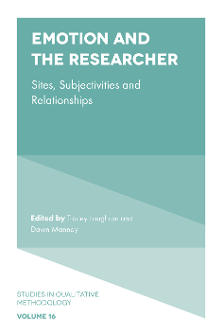
Index
Emotion and the Researcher: Sites, Subjectivities, and Relationships
ISBN: 978-1-78714-612-9, eISBN: 978-1-78714-611-2
ISSN: 1042-3192
Publication date: 23 August 2018
Citation
(2018), "Index", Loughran, T. and Mannay, D. (Ed.) Emotion and the Researcher: Sites, Subjectivities, and Relationships (Studies in Qualitative Methodology, Vol. 16), Emerald Publishing Limited, Leeds, pp. 269-281. https://doi.org/10.1108/S1042-319220180000016033
Publisher
:Emerald Publishing Limited
Copyright © 2018 Emerald Publishing Limited
INDEX
- Prelims
- Introduction: Why Emotion Matters
- Part I: Reflexivity and Research Relationships
- Chapter 1: Role Transitions in the Field and Reflexivity: From Friend to Researcher
- Chapter 2: With a Little Help From My Colleagues: Notes on Emotional Support in a Qualitative Longitudinal Research Project
- Chapter 3: The Positional Self and Researcher Emotion: Destabilising Sibling Equilibrium in the Context of Cystic Fibrosis
- Chapter 4: ‘It’s Not History. It’s My Life’: Researcher Emotions and the Production of Critical Histories of the Women’s Movement
- Chapter 5: ‘You Just Get On With It’: Negotiating the Telling and Silencing of Trauma and Its Emotional Impacts in Interviews with Marginalised Mothers
- Part II: Emotional Topographies and Research Sites
- Chapter 6: Approaching Bereavement Research with Heartfelt Positivity
- Chapter 7: ‘The Transient Insider’: Identity and Intimacy in Home Community Research
- Chapter 8: Emotions, Disclosures and Reflexivity: Reflections on Interviewing Young People in Zambia and Women in Midlife in the UK
- Chapter 9: Shock and Offence Online: The Role of Emotion in Participant Absent Research
- Chapter 10: Love & Sorrow: The Role of Emotion in Exhibition Development and Visitor Experience
- Part III: Subjectivities and Subject Positions
- Chapter 11: The Expectation of Empathy: Unpacking Our Epistemological Bags while Researching Empathy, Literature and Neuroscience
- Chapter 12: ‘Poor Old Mixed-Up Wales’: Entering the Debate about Bilingualism, Multiculturalism and Racism in Welsh Literature and Culture
- Chapter 13: The Emotion of ‘Doing Ethics’ in Healthcare Research: A Researcher’s Reflexive Account
- Chapter 14: Being Both Researcher and Subject: Attending to Emotion within Collaborative Inquiry
- Chapter 15: Blind Spots and Moments of Estrangement: Subjectivity, Class and Education in British ‘Autobiographical Histories’
- Afterword
- Index